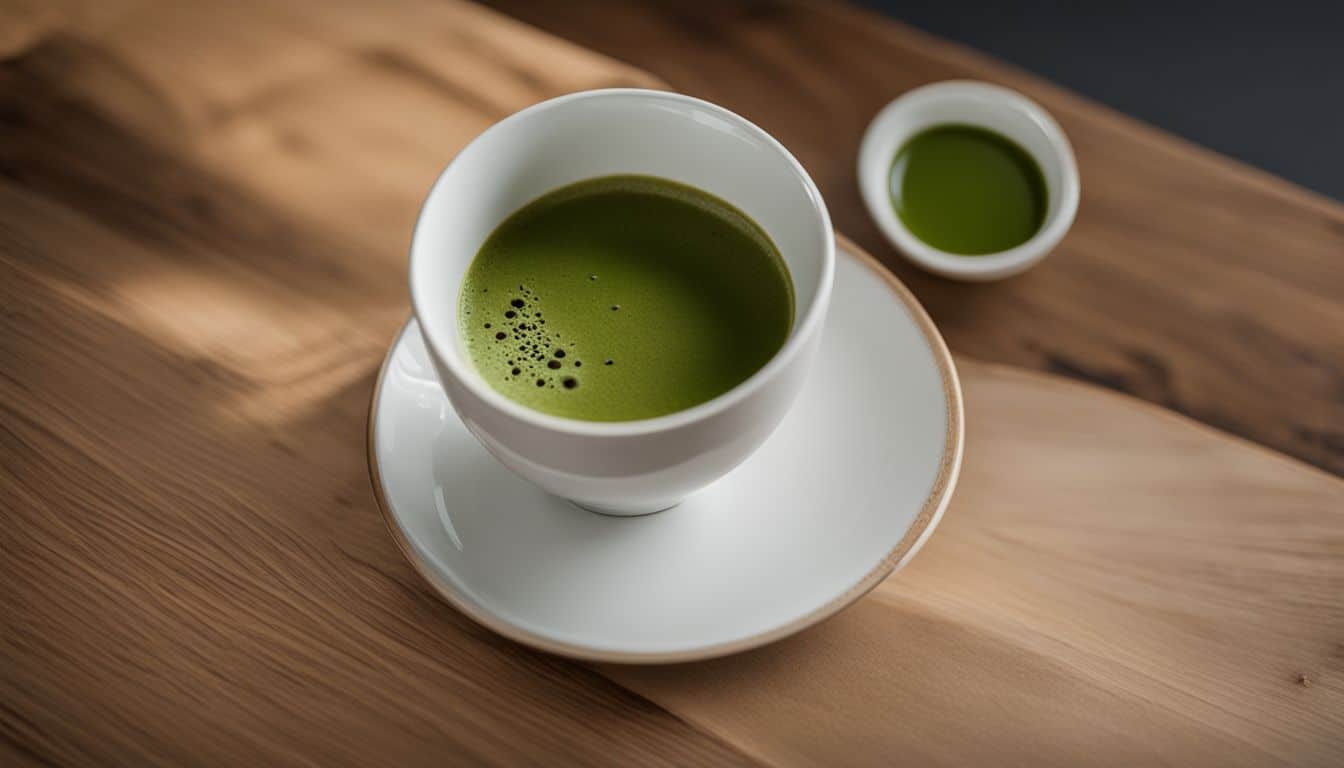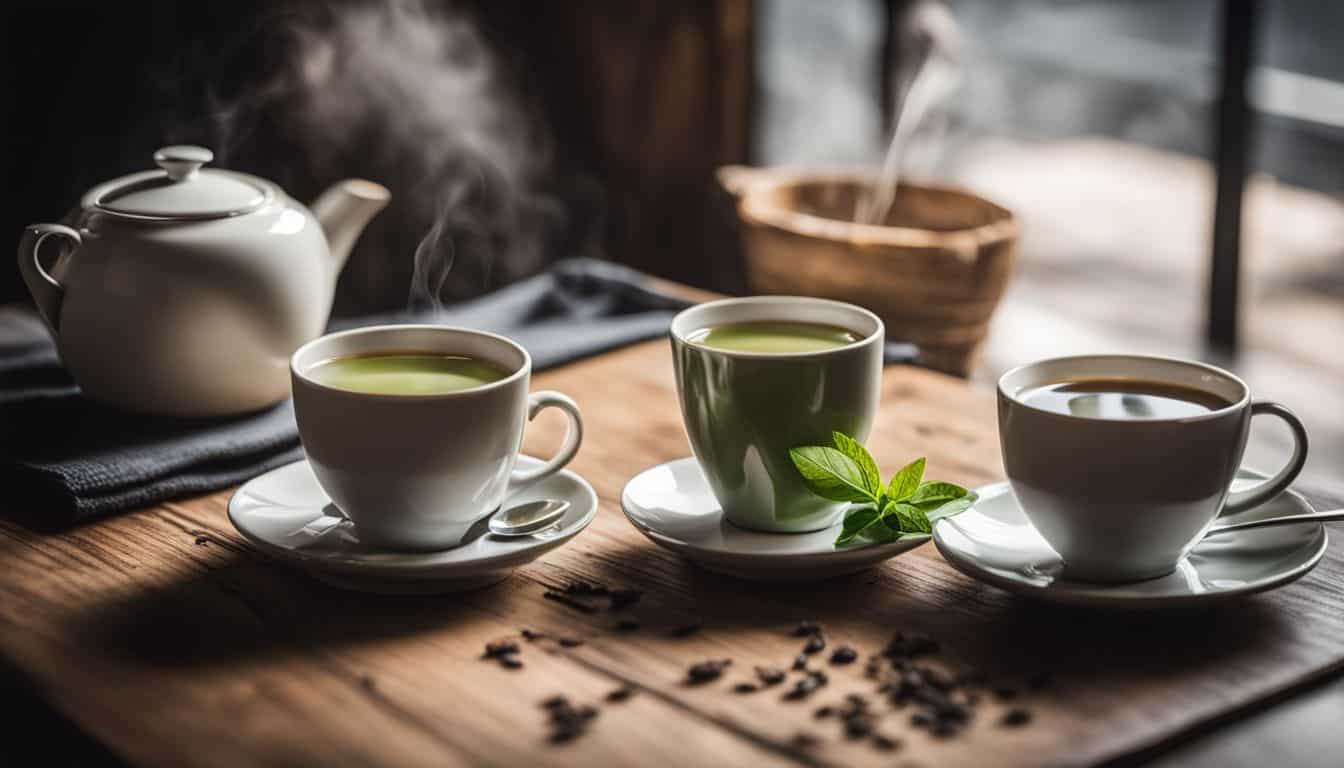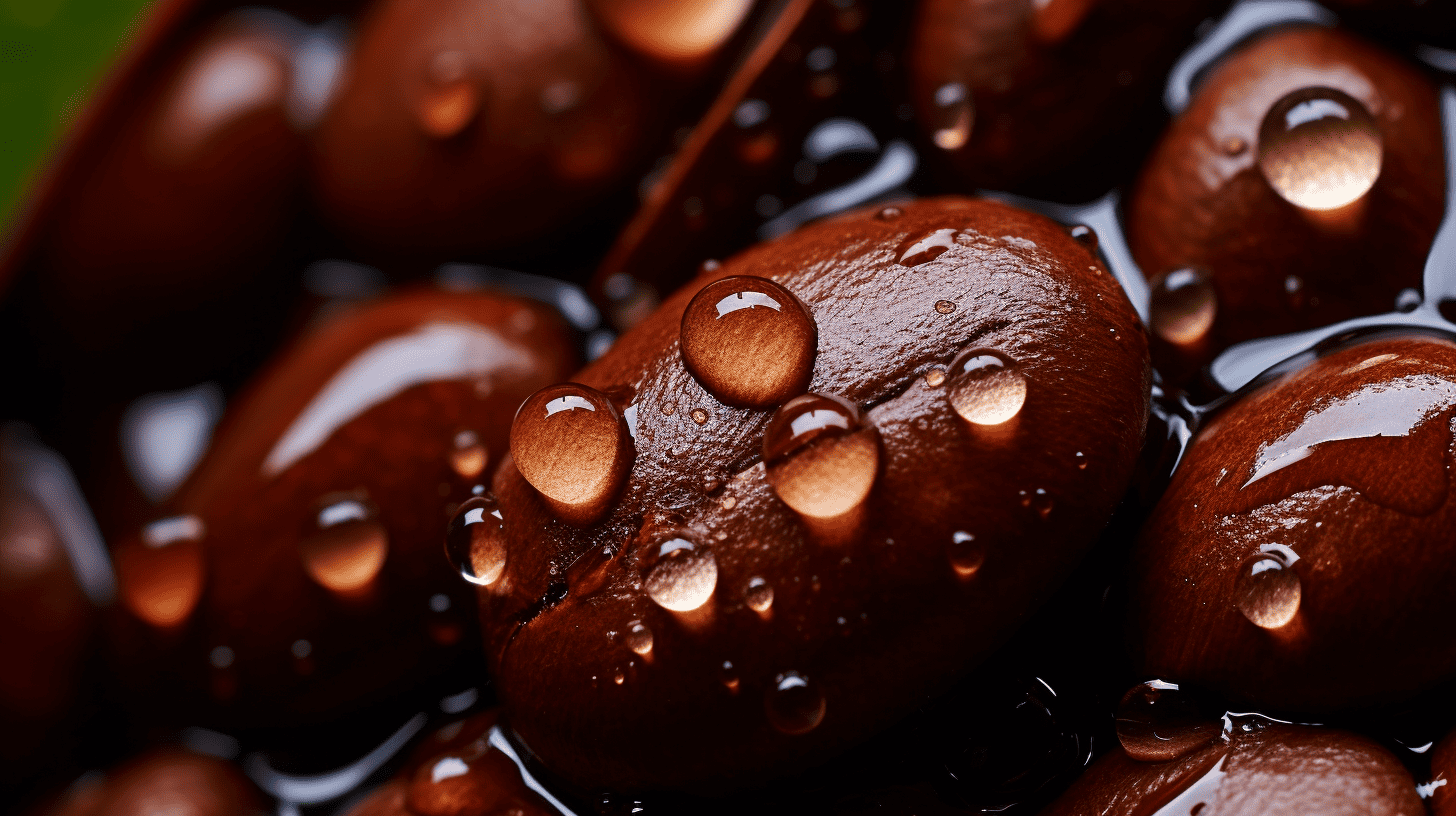Are you wrestling with the decision between matcha vs decaf coffee? Trust me, I’ve been there. After pouring over countless studies and personal experiences, it’s clear there are pros and cons to each drink.
This blog post will guide you through their caffeine contents, health benefits, and how to transition from one to the other if that’s what your heart (or body) desires. Let’s dive in – your perfectly balanced beverage awaits!
Key Takeaways
- Matcha tea has lower caffeine content compared to decaf coffee.
- Matcha tea contains antioxidants that can help protect against chronic diseases and promote healthy skin.
- Decaf coffee offers a reduced caffeine intake and potential weight loss benefits.
Caffeine Content: Matcha vs Decaf Coffee
Matcha tea has a lower caffeine content compared to decaf coffee.
Caffeine levels in matcha tea
Matcha tea is a type of green tea with less caffeine than coffee. Every cup of matcha has about half the amount of caffeine as a cup of coffee or an energy drink. This makes it great for people who want to cut back on caffeine.
Not all cups are the same though! The exact amount can change based on how you make your tea. Something else cool about matcha is L-theanine, an amino acid it has lots of! This helps your body take in caffeine slowly so you don’t feel jumpy like you might after drinking coffee.
You get a nice smooth boost instead!
Caffeine levels in decaf coffee
Decaf coffee is a popular choice for those who want to enjoy the flavor of coffee without the stimulating effects of caffeine. While it is called “decaf,” it still contains a small amount of caffeine, although significantly less than regular coffee.
On average, a cup of decaf coffee contains about 2-5 milligrams of caffeine, which is much lower compared to the 95 milligrams found in an average cup of regular brewed coffee. So if you’re looking to cut back on your caffeine intake, decaf coffee can be a great alternative while still allowing you to savor that delicious cup of joe.

Comparing the effects of caffeine
When comparing the effects of caffeine, it’s important to consider how matcha and decaf coffee can affect your body. Matcha tea has less caffeine than regular coffee, so it provides a milder energy boost without making you feel jittery or anxious.
It also contains L-theanine, an amino acid that helps the body absorb caffeine more slowly, resulting in a gradual and sustained release of energy. On the other hand, decaf coffee still contains some caffeine but at much lower levels compared to regular coffee.
This means you can enjoy a hot beverage without experiencing the stimulating effects of caffeine. Ultimately, personal preference and health considerations should guide your choice when deciding between matcha and decaf coffee.
Benefits of Matcha Tea
Matcha tea offers a lower caffeine content, making it a great choice for those seeking a milder energy boost throughout the day.
Lower caffeine content for a milder energy boost
Matcha tea has a lower caffeine content compared to regular coffee. This means that you can enjoy a cup of matcha and still get an energy boost without feeling jittery or anxious. Matcha contains about half the amount of caffeine as a cup of coffee or an energy drink, making it a milder option for those who are sensitive to caffeine or looking to reduce their intake.
So if you’re looking for a gentler way to boost your energy levels, try switching from coffee to matcha tea!
Rich in antioxidants
Matcha tea is rich in antioxidants, which are beneficial compounds that help protect our cells from damage caused by harmful substances called free radicals. These antioxidants can help reduce the risk of chronic diseases like heart disease and cancer.
Matcha contains a specific type of antioxidant called catechins, which have been shown to have powerful health benefits. In fact, matcha has been found to contain more catechins than other types of green tea.
Antioxidants also play a role in promoting healthy skin and fighting signs of aging. So, choosing matcha tea over coffee can be a good way to increase your antioxidant intake and support overall health.
Promotes better breath and skin health
Matcha tea has some great benefits for your breath and skin health. The antioxidants in matcha can help to fight bacteria in your mouth, promoting better breath and reducing the risk of plaque buildup.
Plus, matcha is rich in catechins, which have been shown to help protect against skin damage caused by UV radiation. So if you’re looking for a hot beverage that not only energizes you but also improves your oral hygiene and gives your skin a boost, matcha is definitely worth considering!
Benefits of Decaf Coffee
Decaf coffee offers a reduced caffeine intake, potential weight loss benefits, and contains cancer-fighting antioxidants. Curious to learn more about these surprising advantages? Keep reading!
Reduced caffeine intake
If you’re looking to reduce your caffeine intake, both matcha tea and decaf coffee can be great options. Matcha contains about half the amount of caffeine as a cup of regular coffee, making it a milder alternative for those who still want an energy boost without the jitters.
Decaf coffee, on the other hand, has had most of its caffeine removed through a special process. So if you enjoy the taste and ritual of drinking coffee but want less caffeine, decaf is worth considering.
Both matcha and decaf coffee offer ways to enjoy a hot beverage without the stimulating effects of regular coffee, so it really comes down to personal preference and health considerations when deciding which one is right for you.
May aid in weight loss
Decaf coffee may aid in weight loss due to its lower calorie content compared to regular coffee. By opting for decaf, you can still enjoy the taste and aroma of coffee without consuming as many calories.
Additionally, choosing decaf can help reduce cravings and prevent overeating, making it easier to maintain a healthy weight. Remember that while decaf coffee may contribute to weight loss efforts, it is important to complement it with a balanced diet and regular exercise for optimal results.
Incorporating other healthy habits into your lifestyle can further enhance your weight loss journey.
Contains cancer-fighting antioxidants
Matcha tea contains cancer-fighting antioxidants that can help protect the body against harmful free radicals. These antioxidants, such as catechins, are known for their potential to prevent and slow down the growth of cancer cells.
By choosing matcha over decaf coffee, you can benefit from these powerful compounds and support your overall health.

Transitioning from Coffee to Matcha
To transition from coffee to matcha, here are some tips for making the switch, different recipes for enjoying matcha, and exploring the variety of matcha flavors available.
Tips for making the switch
Making the switch from coffee to matcha can be an exciting and beneficial change for your daily routine. Here are some tips to help you transition smoothly:
- Start gradually: If you’re used to drinking multiple cups of coffee throughout the day, start by replacing one cup with matcha. This will allow your body to adjust to the lower caffeine intake.
- Experiment with flavors: Matcha comes in various flavors, such as vanilla, mint, and berry. Try different varieties to find the one that suits your taste buds.
- Learn proper preparation: Matcha requires a specific brewing technique. Invest in a good-quality bamboo whisk and learn how to properly whisk the tea powder into a frothy consistency.
- Enjoy with milk or without: Matcha can be enjoyed both as a traditional tea or as a latte with milk. Experiment with different proportions of milk to find your preferred taste.
- Explore matcha recipes: Get creative in the kitchen and explore various matcha recipes like smoothies, ice cream, pancakes, and even baked goods. This way, you can enjoy matcha in different forms.
- Consider caffeine sensitivity: If you have a low tolerance for caffeine or are sensitive to its effects, choose ceremonial grade matcha which has lower caffeine content compared to culinary grade matcha.
Different recipes for enjoying matcha
When it comes to enjoying matcha, there are plenty of delicious recipes to try. Here are some ideas:
- Matcha Latte: Mix a teaspoon of matcha powder with hot water and froth it up with some warm milk. Add a touch of sweetness with honey or agave syrup.
- Matcha Smoothie: Blend together frozen bananas, almond milk, and a spoonful of matcha powder for a refreshing and energizing smoothie.
- Matcha Ice Cream: Make your own homemade matcha ice cream by whisking together matcha powder, heavy cream, condensed milk, and vanilla extract. Freeze it until firm and enjoy!
- Matcha Pancakes: Add a twist to your breakfast routine by adding matcha powder to your pancake batter. Top them off with fresh fruit or maple syrup.
- Matcha Energy Balls: Combine matcha powder, oats, dates, almond butter, and coconut flakes in a food processor. Roll the mixture into bite-sized balls for a healthy snack on the go.
Exploring the variety of matcha flavors
There are many different flavors of matcha to try. Here are some options:
- Traditional Matcha: This is the classic, earthy flavor that most people think of when they hear “matcha.” It has a rich, smooth taste with a slight bitterness.
- Sweet Matcha: If you have a sweet tooth, this is the matcha for you. It has added sugar or other sweeteners to give it a sweeter taste.
- Vanilla Matcha: For those who enjoy a hint of sweetness and a subtle vanilla flavor, this is a great option. It adds a creamy and aromatic twist to your matcha.
- Mint Matcha: If you like refreshing flavors, try mint matcha. The combination of mint and matcha creates a cooling sensation that’s perfect for hot summer days.
- Fruit-flavored Matcha: There are also fruit-flavored matchas available, such as strawberry, raspberry, or mango. These add fruity notes to your cup of matcha for a burst of flavor.
- Coconut Matcha: For those who love the tropical taste of coconut, coconut matcha is an excellent choice. It adds a creamy and slightly nutty flavor to your drink.
- Spiced Matcha: If you enjoy warm and cozy flavors, try spiced matchas like cinnamon or ginger-infused matchas. They provide a comforting taste with added depth.
Conclusion: Making the Choice Between Matcha and Decaf Coffee
In conclusion, the choice between matcha and decaf coffee comes down to personal preference and health considerations. Matcha offers a milder energy boost with its lower caffeine content, while decaf coffee provides a way to enjoy a hot beverage without the stimulating effects of regular coffee.
Both options have their own unique benefits, so it’s important to choose what works best for you.
Is Matcha a Better Alternative to Coffee for Energizing Wellness?
Is matcha a better alternative to coffee for energizing wellness? The debate between coffee versus matcha: energizing wellness has gained traction in recent years. Matcha, a powdered form of green tea, is lauded for its high antioxidant content and gentle energy boost. While coffee provides a quick jolt, matcha offers a more sustained release of energy without the jittery side effects. Whether you prefer the rich taste of coffee or the earthy notes of matcha, both options can contribute to your overall well-being.
FAQs on Matcha Vs Decaf Coffee
1. Is matcha healthier than decaf coffee?
Matcha is considered healthier than decaf coffee because it contains antioxidants, amino acids, and vitamins that provide several health benefits.
2. Which one has more caffeine: matcha or decaf coffee?
Matcha contains lower amounts of caffeine compared to regular coffee but more caffeine than decaf coffee. However, the effects may vary depending on the specific brand and preparation method.
3. Can I use matcha as a substitute for decaf coffee?
Yes, you can use matcha as a substitute for decaf coffee if you prefer a different taste or want to reduce your caffeine intake.
4. How do the flavors of matcha and decaf coffee compare?
Matcha has a unique, earthy flavor with subtle sweetness while decaf coffee has a milder taste similar to regular brewed coffee but with less intensity due to the removal of most of its caffeine content.





Leave a Reply